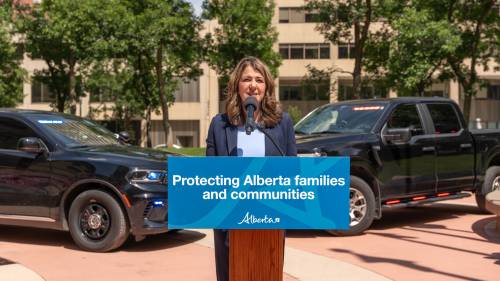Article – The face of Alberta’s potential new provincial police force stepped into the spotlight yesterday, though the road ahead remains filled with questions. After months of behind-the-scenes planning, Justice Minister Mickey Amery introduced Curtis Zablocki as the chief designate who would lead the proposed Alberta Provincial Police Service.
Standing at the podium in Edmonton, Zablocki brought his 30-year policing career to bear on what’s becoming one of Alberta’s most contentious public safety initiatives. As the current RCMP deputy commissioner for Alberta, his selection sends a clear message about continuity during what could be a dramatic transition in provincial law enforcement.
“This is about building a police service that directly reflects Alberta’s unique needs,” Zablocki told reporters. His calm demeanor couldn’t mask the magnitude of the task ahead – essentially building a provincial police force from scratch while maintaining public safety standards Albertans expect.
I’ve covered policing issues in Calgary for over a decade, and yesterday’s announcement represents perhaps the most significant shift in Alberta’s law enforcement landscape in generations. The province has relied on the RCMP for rural and small-town policing since 1932, making this potential divorce a profound change to a nearly century-old relationship.
Mayor Jyoti Gondek wasted no time expressing concerns about the financial implications. “Calgarians deserve to know exactly what this means for our city budget and for community safety,” she said during an impromptu media availability. Her skepticism reflects growing unease among municipal leaders about costs and transition plans.
The government estimates transitioning to a provincial force would cost approximately $498 million over six years, though independent analyses suggest the figure could climb substantially higher. For context, Alberta currently spends about $257 million annually for RCMP services, with the federal government contributing roughly $170 million through cost-sharing agreements.
What’s particularly striking about yesterday’s announcement was its timing. While Albertans continue struggling with healthcare access issues and economic pressures, Premier Danielle Smith’s government has prioritized this policing overhaul despite mixed public support. A recent Angus Reid poll showed only 38% of Albertans favor replacing the RCMP.
The Rural Municipalities of Alberta has repeatedly voiced concerns about the plan. “Our members have consistently indicated they’re satisfied with RCMP service and worried about bearing additional costs,” said Paul McLauchlin, RMA president, during our conversation last month about rural crime issues.
Political scientist Duane Bratt from Mount Royal University told me this initiative represents “a key pillar in Premier Smith’s sovereignty vision,” suggesting the police force transition is as much about provincial identity as it is about public safety outcomes.
For Calgary residents, the immediate impact remains limited since the city maintains its own municipal police service. However, the ripple effects could touch everything from regional crime initiatives to emergency response protocols as jurisdiction boundaries shift.
Chief Zablocki emphasized that improving response times in rural areas would be a top priority, addressing a longstanding complaint about RCMP service in remote communities. “We can design a service that puts resources where Albertans need them most,” he said.
The government intends to introduce legislation this fall to formalize the transition, though actual implementation would likely take years. Justice Minister Amery stressed that “no community will see a reduction in service” during any potential transition.
What’s clear from yesterday’s announcement is that while the province has selected its potential police leader, the debate about whether Alberta should proceed with this massive undertaking is far from settled. The financial, operational, and political questions will continue dominating public safety discussions across our province.
For Alberta communities currently served by the RCMP, the coming months will be crucial as more details emerge about staffing models, transitional arrangements, and community input processes. The province promises engagement sessions beginning next month.
As this story develops, I’ll be tracking the implications for Calgary and surrounding communities. After covering public safety in this province for years, I can say with certainty: few initiatives have generated this level of institutional uncertainty combined with such profound questions about provincial identity and fiscal responsibility.







